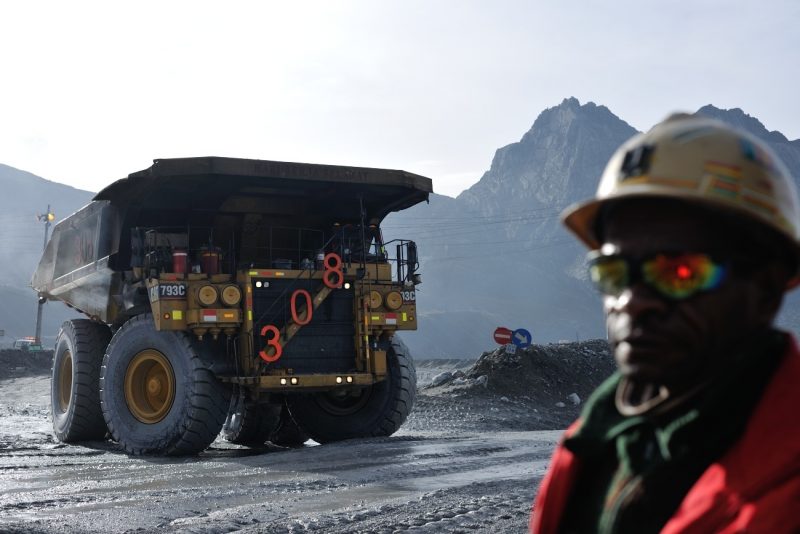For the Indonesian arm of US mining giant Freeport McMoRan, 2017 has hardly been a stellar year. With seemingly endless legal tangles amid contract negotiations and ongoing labour disputes, the year will be marked as one in which much was developed despite the odds. So, three-quarters of the way through the year: what has been achieved and what is left?
Going public
Indonesia Stock Exchange President Director Tito Sulistio said Indonesia is the global mining giant’s largest revenue raiser and it is time it goes public in Indonesia.
Speaking in July, Sulistio said the firm, which is listed overseas, was previously listed in Indonesia from 1994 to 1995 under the name Indocopper. During that time, the shares accounted for 9.36 percent of Indocopper and were purchased by a Freeport affiliate, returning to the firm after the 1995 delisting.
“They reap profit in Indonesia, but the holding company is listed overseas,” he said.
The call is part of a larger push to list 53 foreign companies who have major operations in Indonesia, yet are listed elsewhere, to go public on the IDX. Targeted foreign companies include those in mining, property, palm oil and plantations, according to a report from Tempo. Most are listed in Singapore, Australia, China and Malaysia.
Now is the time, Sulistio told Freeport and others. Previous concerns over Indonesia’s stock exchange have all but disappeared after a series of structural reforms.
Concerns over lacking liquidity have been resolved with the IDX now serving 340,000 transactions daily, he said. Plans to attract more state-owned firms will also help solidify the market.
“Indonesia has many infrastructure projects and it is time for them to be financed by the capital market, instead of the state budget,” he said, as reported by Tempo.
Sulistio also noted Indonesia’s strong economy as an incentive.
“We have also obtained investment grade. There’s no reason not to be listed at the IDX,” he said
Divestment, divestment, divestment
Freeport Indonesia has announced plans to release shares equivalent to 5 percent in the near future. This is part of a larger 15 percent share divestment process to be undertaken by Freeport McMoRan, the majority shareholder of Freeport Indonesia.
The Indonesian government has maintained Freeport must divest shares if it intends to continue operations within the country. Introduced in January, the government demanded Freeport must give up the 1991 contract as well as divest a 51 percent stake in its local unit, pay higher royalties and construct a second copper smelter. The demands brought the Grasburg mine in Papua, the third largest copper mine in the world, to a grinding halt.
The announcement of the 5 percent divestment, made by Industry Minister Mohamad S. Hidayat in July, followed contract renegotiations with Freeport Indonesia CEO Rozik Soetjipto during which stock divestment was on the agenda.
Freeport is expected to offer a 10 percent stake to the central government, which would be passed on to the provincial government of Papua if declined. A further 5 percent is expected to be offered to the public, listing Freeport on the Indonesian Stock Exchange.
Divestment is just the first step in creating a long-standing agreement between the miner and the government. Freeport has insisted a new contract be drawn up before committing to the US$15 billion investment necessary for the new smelter.
“Freeport Indonesia promised to comply with Indonesia’s mineral and coal laws but has no plans to build a smelter. It is preparing a (memorandum of understanding) with three Indonesian smelter companies,” Hidayat said.
Renegotiations
Finance Minister Sri Mulyani Indrawati earlier this month continued negotiations with Freeport. She said any outcome must see increased government revenue.
“Any term, any name used, I don’t care. The main thing is the revenue collected by the government should be greater than before. That’s the government’s stance. And it’s being formulated,” she told Tempo.
Negotiations, which began in May, are stalling with the government insisting on a 51 percent divestment and Freeport advocating for 30 percent. The miner argues it has ‘reduced its obligation’ after large-scale investment, according to Tempo.
The arduous nature of the negotiations does not concern Indrawati: “We are prepared to negotiate until an agreement is reached. Thereafter, we will talk about the composition, when, who would be potential buyers and the arrangement.”
Negotiations will continue until October, with Freeport McMoRan, parent company of Freeport Indonesia, Chief Executive Richard Adkerson warning a willingness to go to international arbitration if necessary.
Labour woes
Regulations aren’t the only problem for Freeport Indonesia, with a 5,000 worker strong strike extending into its fourth month.
Late July, Reuters reported Freeport Indonesia Union Industrial Relations Officer Tri Puspital said no solution had been found to worker’s concerns. The strike was called in May after 10 percent of the workforce had been laid off amid cost-cutting.
By May, Freeport management said mining rates at the massive Grasberg mine had been impacted by the strike.
“We will demand that the government uphold fundamental labour standards,” IndustriALL Assistant General Secretary Kemal Özkan told Reuters ahead of a meeting in Indonesia.
IndustriALL represents 50 million workers in 140 countries and has previously focused on the region’s dangerous garment industry.
This article was co-written by Shannon Claudia and Erin Cook.




